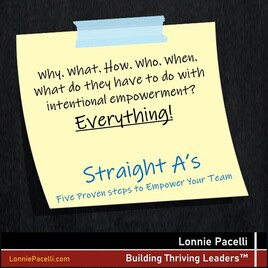
Some time back I was working with a leader who was having difficulty with his employees feeling empowered in their work. Ned (not his real name) was frustrated. "I don't understand it!" he stammered. "I assign tasks out, stay out of their way while they're completing the tasks, hold them accountable to dates, and praise them when the task is done well. I do all this yet my employees tell me I don't empower them. I'm ready to pull my hair out (ironically he was folically challenged)".
0 Comments

Several years back I conceived and funded a small business. My partner and I were very excited about the concept and had sky-high aspirations about the prospects of the business. While the idea was great, I ultimately decided to shut the business down as I felt the cost of keeping the business afloat would continue to outstrip the revenue. I'm not going to bore you with the details of the business; what I do want to do is talk with you about the decision process I went through and how the "morning after" decision making process tipped the scales for me.
 I remember my first position as a manager, selling clothes in a department store to work my way through college. One of my colleagues, who I’ll call Jay, was also a good friend. We ran together, went to movies, and overall had a great time. After I got promoted and became his boss, we still did some things together—but there was persistent tension in our relationship. He didn’t like the fact that I was his boss and would tell me that he worked for my boss, not me. He then became chummy with another guy who was his peer in another department. This tension existed until I graduated from college and left the department store. Once I wasn’t his boss, the tension lifted. That was my first experience with the “them” team. Read more at ProjectManagement.com.  I am a huge fan of 360-feedback evaluations, a tool in which a participant and their leader, peers and followers evaluate them using a series of structured questions. With the 360 evaluations I’ve gone through, the results were presented to me in terms of how I view myself versus how my leader, peers and followers viewed me. My first 360 was part of a five-day leadership offsite where survey participants completed the survey prior to the offsite and the results were given to us at the end of the third day. Prior to handing out the evaluation results, I can remember the offsite facilitator saying, “You’re probably going to see some things that will hurt. Take some time to go through the feedback tonight in your hotel room, then let’s talk tomorrow about what you’ll do with it.” We got the packets with our individual evaluation results. I remember being excited to see the results, expecting to be reaffirmed by how others viewed me as a leader. Then I opened the packet. Read more at ProjectManagement.com.  I remember as a kid being entertained by plate spinners. The performer would spin bowls, plates or other flat objects on poles and keep them all spinning without falling off. I watched each plate spinner run from pole to pole, jiggling the pole to keep a plate from wobbling and falling off. The spinner had to prioritize those plates most likely to fall off the pole first, get them spinning again, them move on to the next teetering plate. Sometimes, the spinner was able to keep everything spinning; sometimes, a plate crashed to the ground, to the “oohs” and “aahs” of the crowd. Welcome to the world of managing multiple projects. As a young PM, I was managing three large engagements. I was bound and determined to show everyone I could do it. Long story short, I ended up tanking not one, not two, but all three projects. All three plates came crashing down. It was one of the most painful experiences I ever went through as a PM…one that I was determined not to repeat. I’ve been asked how many projects is reasonable for a PM to manage. Honestly, it depends on several key factors: Read more at ProjectManagement.com. 
Some time back I was talking with a fellow project manager about a difficult issue he was having with his new boss. The thumbnail summary of the discussion was that the project manager was feeling overly scrutinized and micro-managed. Now I knew the project manager to be a capable professional who could confidently handle the work assigned to him. Yet his boss insisted on managing every detailed aspect of his work. More so, his boss was very critical of the work being done even though it was performed to professionally acceptable standard. The situation became unbearable for the project manager; he ultimately left the organization.
 E.F. Hutton was a financial brokerage firm founded in 1904 by brothers Edward Francis and Frankly Laws Hutton. In the 1970s, E.F. Hutton created an advertising campaign with the slogan, “When E.F. Hutton talks, people listen.” The slogan implied that E.F. Hutton didn’t mince words, and that any advice given was valuable. For me, it ranks right up there with “Two all-beef patties…” and “Plop plop, fizz fizz…” Now that I’ve planted a couple of commercial jingles in your head that you may be singing the rest of the day, let’s get into how this is relevant to being a great project manager. In my early days as a consultant, I mistakenly believed that my job was to tell, that the client was expecting me to talk on any topic and espouse my wisdom. As a result, I tended to use a lot of words to communicate what I thought needed to be communicated. As I grew, I noticed those who were particularly impactful at getting their point across. They didn’t simply fill the air with words; it was quite the opposite. They sat back and listened while others did the talking, then, when ready to speak, came into the conversation with a profound question or statement that caused others to think. What they said was concise, relevant and thought-provoking. I also noticed something else--whenever that person spoke, others generally stopped talking to yield the floor. People like that make their words count. They have what I call a high value per word. Read more at ProjectManagement.com.  Mr. Creosote. Some of you may know the name. He was a character in Monty Python’s The Meaning of Life. Portrayed by Terry Jones, Mr. Creosote ate and drank massive quantities in a French restaurant. At the end of the meal, the server (played by John Cleese) offered Mr. Creosote a wafer-thin mint. After some objection, Mr. Creosote agreed to eat the mint, which caused an unfortunate reaction. Those of you who know the skit (or just searched for it) know my description cleaned things up quite a bit. While most could have easily eaten the small mint without any adverse consequence, for Mr. Creosote it was just too much to handle. He had hit a saturation point. This analogy applies directly to how much newness an organization can absorb before things start breaking. It’s the organization’s saturation point. Read more at ProjectManagement.com. 
In an earlier leadership role I had been striving to create focus and accountability within each of our major work areas. The team responded beautifully with doing their best to adjust to roles, to stay focused on their areas, and to minimize confusion by stepping across boundaries. They did exactly as I asked.
We were in a team meeting and I could see that there was erupting confusion around contacting customers in an effort to close some sales. There was a lot of respect for my sales & marketing manager in not stepping in on her turf when it came to customers. Where the problem arose, though, was in the fact that the team was confused as to who was supposed to be following up on some key sales activity that had begun prior to our organizational re-alignment. 
So maybe you think you're all that and a bag of chips and that you can get more things done than most people in your organization. As managers, though, it's not just about you getting things done on your own; it's about you getting your team to be as effective (or more) as you.
I deliberately use the term effective versus efficient. For me, there is a very clear distinction which I believe is crucial in driving results. |
Topics
All
Reprints
Contact Lonnie about article reprints. Please specify article you wish to reprint. Backlist
See Lonnie's Amazon Author Page Archives
July 2024
|
Lonnie Pacelli - Building Thriving Leaders™
Insightful | Creative | Direct Advice to Help Leaders Help Themselves
Keynote Speaker | Board Director | Autism Advocate | Author | Project Management Expert | Microsoft/Accenture Veteran
See his books on Amazon
Insightful | Creative | Direct Advice to Help Leaders Help Themselves
Keynote Speaker | Board Director | Autism Advocate | Author | Project Management Expert | Microsoft/Accenture Veteran
See his books on Amazon
Services |
About
|
© COPYRIGHT 2019. ALL RIGHTS RESERVED.
We are a participant in the Amazon Services LLC Associates Program, an affiliate advertising program designed to provide a means for us to earn fees by linking to Amazon.com and affiliated sites.
|

 RSS Feed
RSS Feed